On Thursday, the German Standing Vaccines Commission (STIKO) recommended that 5-11 year olds who are at risk of severe courses of Covid-19 – or those who have vulnerable relatives – should be vaccinated against Covid with a lower dose of Pfizer/BioNTech.
The Covid vaccine won’t just be limited to this particular group, however, as the vaccine experts made it clear that healthy children should also have the opportunity to get a shot after a consultation with their doctor.
READ ALSO: German vaccine panel recommends Covid jabs for ‘at-risk’ young children
The specially dosed vaccine – which comes in brightly coloured vials and contains on 10mg of vaccine, compared to 30mg for adults – is now being delivered to state vaccination centres and clinics across Germany. With it, Germany will enter a new phase of the pandemic in which almost everyone over the age of five will have the opportunity to gain immunity against Covid.
Here’s how each of the German states are planning to roll out Covid shots for children – and when you’ll be able to find an appointment near you.
The Ministry of Health in Baden-Württemberg sees the paediatricians’ practices as the main point of contact for the vaccinations of children between the ages of five to 11. “Paediatricians know their patients best and know which children should be vaccinated as a priority,” it said. In addition to the practices, there will also be vaccination campaigns in districts as well as in clinics. According to the latest ministry information, special vaccination drives for children and their parents will be carried out in the Rems-Murr district and in Tübingen. The state anticipates that the first jabs for under-12s will be rolled out from Wednesday December 15th.
In Bavaria, according to health minister Klaus Holetschek (CSU), children from the age of five will be able to be jabbed in vaccination centres and doctors’ practices from Wednesday onwards – provided that the federal government keeps its delivery promises. The vaccination centres in the state have ordered around 240,000 doses. “We have already asked the vaccination centres to offer special family vaccination appointments,” Holetschek said. According to a ministry spokeswoman, the stations are to be designed in a child-friendly way and children will receive freebies such as crayons after getting their jabs.
In Berlin, Covid vaccinations for children are to begin in the three state-owned vaccination centres on Wednesday. There will be a total of 35 additional vaccination booths for children available. Child vaccinations in primary schools by mobile vaccination teams are also planned. These will be possible from Wednesday to Friday in the afternoon and all day on Saturday and Sunday and can be booked by telephone on by calling 030 9028 2200 between 7am and 6pm daily. Vaccination offers for children are also planned for the Christmas holidays.
According to regional radio station rbb24, vaccinations of 5-11 year olds are due to kick off in Brandenburg on Tuesday “at the latest” after doses are delivered on Monday. Children in Brandenburg are to be vaccinated primarily in paediatricians’ practices. However, paediatric clinics and regional vaccination centres are also to be included. There will also be mobile vaccination services travelling to locations around the state – though the planning for this has not yet been finalised.
In Bremen, a central paediatric vaccination centre has been set up for this age group, which will start operations on Tuesday. There, paediatricians and adolescent doctors are available for counselling, and information materials specially suited for children are also being prepared. Mobile vaccination services aren’t currently being planned for children – though this could change in the future.
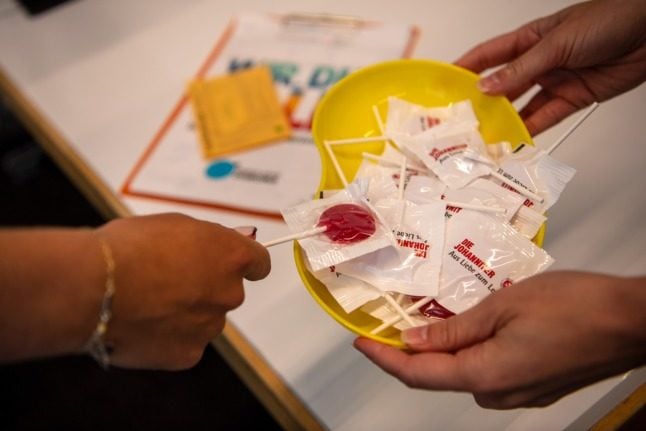
A young child is given a free lollipop after getting vaccinated in Bremen. Photo: picture alliance/dpa | Sina Schuldt
The northern city state of Hamburg will receive an initial batch of the children’s vaccine on December 15th and aims to start rolling out vaccinations on the 16th. According to Hamburg Senate, the jabs will be carried out exclusively by paediatricians to ensure that the vaccine doses are distributed widely. Appointments can be booked with a state doctor by calling 116 117 and selecting the ‘Covid vaccination’ option.
In the state of Hesse, some paediatricians have already been issuing lower doses of the Pfizer/BioNTech vaccine since the EMA approval, but the official doses are expected to arrive anytime from the 13th to 15th. The vaccinations are to be offered primarily by paediatricians and adolescent doctors, though paediatric clinics and the public health service will also offer assistance. Appointments can be booked online from the 15th.
Regions in Lower Saxony will be kicking off their vaccinations for children at different times, with Hanover starting out with a child vaccination drive in the zoo on December 15th. Braunschweig will follow on December 18th with a special vaccination day in the town hall. In addition, paediatricians and mobile child vaccination teams will carry out jabs for 5-11 year olds over the coming weeks.
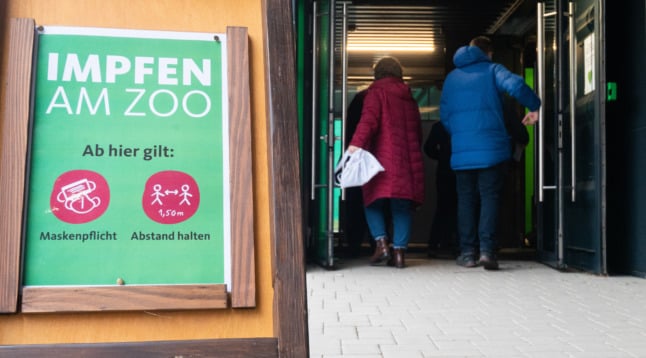
People walk into the vaccination clinic at Hannover Zoo. On December 15th, the Zoo will hold a special child vaccination day and offer its first jabs to 5-11 year olds. Photo: picture alliance/dpa | Julian Stratenschulte
In Mecklenburg-Western Pomerania, children in this age group are to be vaccinated primarily at paediatricians’ offices. Where they are not available to give out shots, there will be offers at vaccination centres in the districts and cities, said health minister Stefanie Drese (SPD) on Friday. Vaccination action days for children and their families are being planned.
The vaccination stations of districts in North Rhine-Westphalia will offer vaccinations for 5-11-year-olds at paediatricians’ surgeries, according to the Pharmacists’ Association of North Rhine-Westphalia. State-run vaccination centres and other state clinics will follow on Friday, December 17th. At least half of the vaccinations are to be given by appointment.
READ ALSO: German health workers must be fully vaccinated by March 15th 2022
The state government of Rhineland-Palatinate is aiming to start vaccinations at the Mainz-Bingen vaccination centre on Thursday, with others to follow on December 22nd and 23rd. Parents have been able to register their children online or via a hotline since December 1st. However, the state health ministry says the main point of contact should be the paediatricians and adolescent doctors, where the appointments are allocated individually.
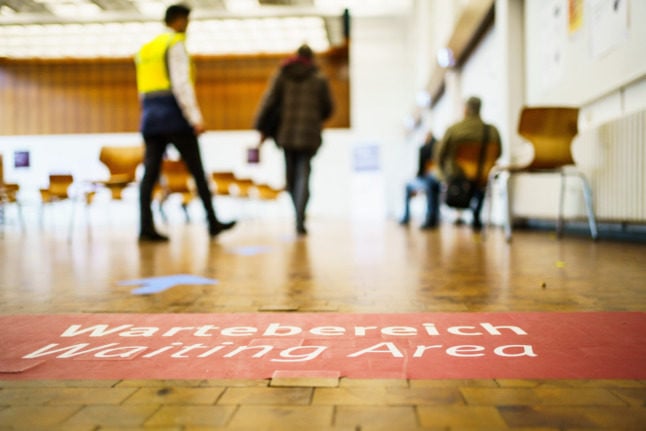
People walk through the vaccination centre in Mainz, Rheinland-Palatinate. From late December, 5-11 year olds will be able to get vaccinated here. Photo: picture alliance/dpa | Andreas Arnold
Shortly after Thursday’s recommendation from STIKO, Saarland announced that parents could start booking appointments for Covid jabs for 5-11 year olds at the state’s centralised vaccination centres. These are likely to begin on December 16th. According to the health ministry, these jabs will be carried out by paediatricians or those with experience of treating children so that parents can seek advice beforehand if they need it. In addition, the state said it had been in discussion with paediatricians to ensure that even healthy children will be able to be receive a shot after a consultation.
According to the social affairs ministry, 87 paediatricians and adolescent doctors in Saxony-Anhalt have so far declared their willingness to vaccinate children in this age group, 40 of whom have said they will support vaccination centres if needed. Some districts and cities have organised additional vaccination services. The public vaccination centres in Magdeburg, the Burgenland district and the district of Anhalt-Bitterfeld will probably not start vaccinating children until next year.
READ ALSO: Germany to roll out Covid vaccinations for 5-11 year olds
Ahead of the other Germans states, the Herzzentrum Leipzig in the eastern state of Saxony started offering vaccinations for 5-11-year-old children a week before the start of the official campaign. From Monday, December 13th, vaccinations for children will also be available both at paediatricians’ surgeries and as a special service provided at a handful of centralised vaccination centres. According to Saxony’s health minister, Petra Köpping (SPD), it should be possible for parents to register their children in the vaccines appointment portal this week. Though not every vaccination centre will be providing jabs for young kids, appointments will be available at pop-up clinics and a few of the central locations.
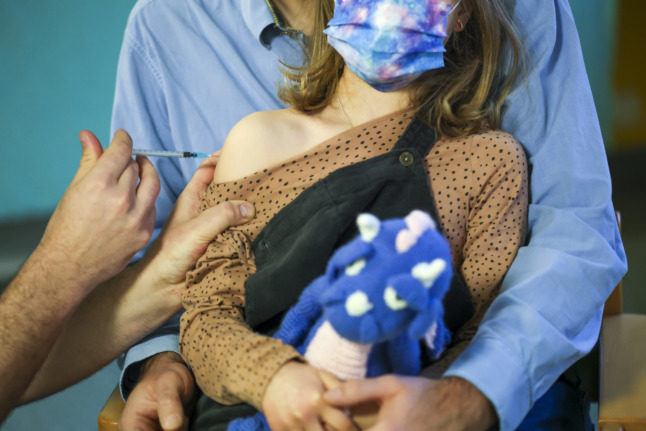
A paediatrician administers a Covid jab to a 7-year-old girl in Saxony. Photo: picture alliance/dpa/dpa-Zentralbild | Jan Woitas
Vaccinations for 5-11 year olds will begin in two locations in Schleswig-Holstein from December 14th-18th, with appointments available via the centralised vaccination portal from the 16th. On December 19th and January 9th, almost all vaccination centres in the country will hold dedicated child-vaccination drives. From December 23rd onwards, parents of young children will be able to book vaccination appointments every Tuesday and Thursday between 5:30 and 7:30 pm.
In Thuringia, just 3,000 appointments for vaccinations of 5-11 year olds have been released at a handful of public vaccination centres for the time being. “We are first cautious about whether the promised vaccine will actually arrive and whether the offer will be taken up at all,” said the vaccination manager of the Association of Statutory Health Insurance Physicians, Jörg Mertz. From December 27th, the appointments will then be extended to vaccination centres throughout Thuringia.

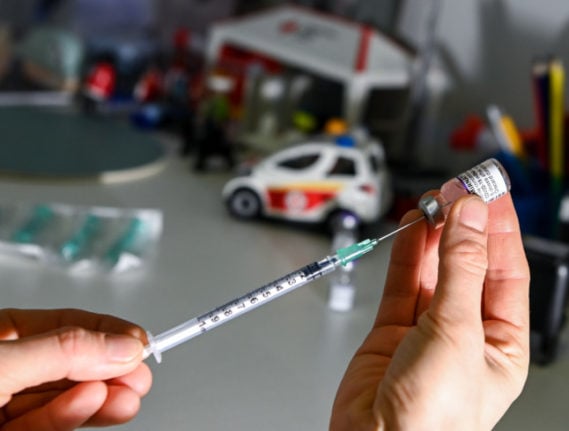

 Please whitelist us to continue reading.
Please whitelist us to continue reading.
Member comments